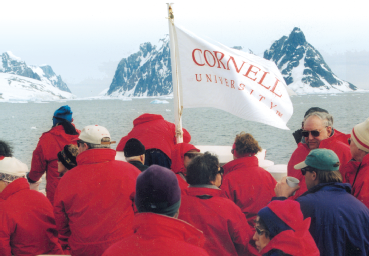Cornell's Adult University turns forty
Cornell's Adult University turns forty

A year after the Summer of Love, the campus was rife with social unrest as students protested the racial and sexual discrimination they perceived at Cornell. The tumult prompted two young graduates to approach President James Perkins and demand that the University begin leading its alumni by the mind, offering them the opportunity to maintain intellectual connections to Cornell. Forty years later, the organization that resulted—Cornell's Adult University—is the largest program of its type in the country, having educated more than 50,000 people since its inception.
Each year, CAU offers about sixty programs—weeklong educational courses on campus in the summer and trips throughout the year ranging from a long weekend to a month. Participants in the summer programs generally live in the dorms and eat in the dining halls, and for many the collegiate atmosphere is a major attraction. "It reminds you why you came to Cornell," says Penny Skitol Haitkin '65, who has taken about a dozen on-campus classes and gone on several trips, including a music history tour of Memphis. "It reconnects you with the incredible faculty that Cornell is lucky enough to have."

The on-campus offerings range from politics to sculpture to local ecology; the trips have included a journey to New Zealand (to study the "Ecology of Middle Earth") and a cruise around Asia led by a geologist and a historian. "For a teacher, CAU is a unique and wonderful experience," says Glenn Altschuler, PhD '76, the Litwin Professor of American Studies, one of CAU's most active faculty. "It probably ties alumni back to Cornell more effectively and substantively than anything else the University does, because people are coming together around ideas and shared intellectual interests." The atmosphere at CAU, he says, is distinct from undergrad classes because students come fueled only by a desire to learn, rather than to earn a degree. "Adults are in no sense intimidated by the professor and therefore perfectly willing to disagree," he says. "That enriches the environment in incalculable ways. I have to be on my toes."
Another benefit of traveling with CAU, supporters say, is privileged access; many faculty use their contacts to enhance the trips, such as arranging for backstage tours during a London theater jaunt or a talk by a casino owner in Las Vegas. Another educational perk is team teaching, where professors from different fields complement each other—as in this summer's trip to the Aegean with President Emeritus Frank Rhodes, a geologist, and Scott MacDonald, a professor of Christian studies and chair of the philosophy department.
CAU programs are pricey: the on-campus courses cost about $1,400 a week, and the trips to Europe or privately chartered cruises can run anywhere from $4,500 to $13,000. But according to Director Emeritus Ralph Janis '66, the high return rate is proof that participants feel it was money well spent. "The programs are expensive in part because they are unbelievably complete—everything is covered," he says. "You get everything you expect and a little bit more."
— Bekah Grant '08


